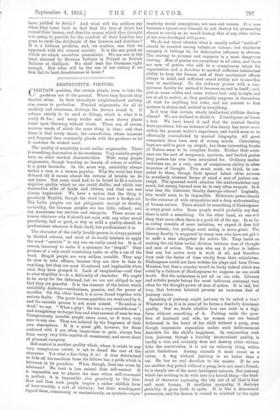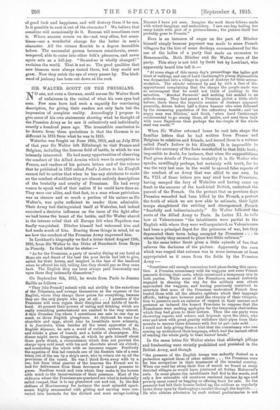DESTRUCTIVE VIRTUES.
CERTAIN qualities, like certain plants, seem to take the goodness out of the ground. Where they flourish they flourish alone. In their immediate neighbourhood nothing else comes to perfection. Plucked mignonette, for all its modesty and sweetness, destroys the flowers round it. It refuses utterly to be used as foliage, which is what it is really fit for ; and many bolder and more showy plants insist upon blooming without rivals. There are, of course, noxious weeds of which the same thing is true; and then there is that lovely sinner, the convolvulus, whose innocent and fragrant face constantly pleads with the gardener to let it continue its wicked work.
The quality of amiability is not unlike mignonette. There is something destructive in its sweetness. Very amiable people have no other marked characteristics. With many people mignonette, though boasting no beauty of colour or outline, is a great favourite. In the same way, amiability always makes a man or a woman popular. Why the word has been debased till it means almost the reverse of lovable we do not know. But some word had to be found to fit a curious negative quality which no one could dislike, and which was destructive alike of faults and virtues, and that one was chosen haphazard. We have a notion that the thing is peculiarly English, though the word has such a foreign air. The Latin peoples are not phlegmatic enough to develop amiability, the German peoples are too little refined, and the Americans too nervous and energetic. There seems no reason whatever why it should not exist with any other moral peculiarity, had or good, or why so mild a quality should be prodomiuunt wherever it finds itself, but predominant it is.
The character of the really lovable person is always painted in decided colours, and most of us would hesitate to apply the word "amiable" to any one we really cared for. It is, of course, incorrect to make it a synonym for "stupid." Only persons of a very small vocabulary make so silly a use of the word. Stupid people are very seldom amiable. They may be slow to take offence, because they are slow to take in anything, but they are most ill-natured and implacable when once they have grasped it. Lack of imagination—and that is what stupidity is—is a deformity of character. We ought to be sorry for the deformed, but we are not obliged to say that they are graceful. It is the element of the heroic which amiability destroys—enthusiasm, passion, and the power of sacrifice. On the other hand, it is never found together with serious faults. The great human qualities are weakened by it, and the amiable person is not muoh missed. "So-and-so is dead," we say. "What a pity I He was a very amiable man "; and straightway we forget him and what manner of man he was. Conspicuously amiable people never come, as it wore, very near to any one. They are isolated by the fragrance of their own atmosphere. It is a great gift, however, for those endowed with it are often impervious to pain, always free from worry, very little capable of resentment, and never short of pleasant company.
Self-control is another quality which, where it exists to any very conspicuous extent, is apt to dwarf the rest of the character. Yet what a fine thing it is I A man determined to bide all his emotions from his fellows has a pride which is inhuman in its grandeur. What, though, does one mean by inhuman P No trait is less animal than self-control. It is impossible not to admire the man whose self-command Is perfect; it is impossible also genuinely to like him. Now and then such people inspire a rather childish form of hero-worship, a sort of idolatry ; but their worshippers regard them, consciously or unconsciously, as symbols—signs
implying moral conceptions, not men and women. If a wan becomes a tyrant over himself, he will destroy his personality almost as surely as he would destroy that of any other victim of his over-developed will-power.
We do not know whether what is usually called "method" should be counted among talents or virtues ; but whichever category it belongs to, its destructive influence is obvious.
The craving to arrange and organize is a most dangerous craving. Men of genius are exceptions to all rules, and t hero are men of genius who add to a conspicuous talent for organization and a devotion to method sufficient intellectual ability to keep the human end of their mechanical efforts always in mind, and sufficient moral ability not to sacrifice men to machinery. To the ordinary person with a con- spicuous faculty for method it becomes an end in itself ; just as some critics and some writers look only to style and not at all to matter, so they gradually suppress in themselves all wish for anything but order, and are content to find systems in stones and method in everything.
Is it true that certain wholly intellectual abilities destroy others P We are inclined-to doubt it. .L' intelligence eat bonne a tout. We have heard it said that the musical faculty
destroys others, but an instance of this theory has never come within the present writer's experience, and would seem to be effectually contradicted by musical biography. All great composers have been men of strong minds. Calculating
boys are said to grow up stupid; but these interesting freaks of Nature seem to be complete freaks. Neither their exist-
ence nor the sort of temporary, spurious, and limited genius they possess has ever been accounted for. Ordinary mathe- maticians are, as a rule, men of conspicuous ability in other branches of thought. This much must, we think, be con- ceded to them, though their special talent often arouses in peculiarly abstract forms of mind a sort of jealous con- tempt. The ignorant world admires the mathematician very much, but among learned men he is very often suspect. Is it true that the histrionic faculty destroys others? Logically, this would seem to be impossible. Histrionic power should be the outcome of wide sympathies and a deep understanding of human nature. There should be something of Shakespeare in every great actor. Some people would probably say that there is such a something. On the other hand, no one will deny that more often there is a good bit of the ape. In so fax as acting consists of more imitation, we expect it does kill other talents ; but perhaps such acting is never great. The literary faculty is supposed by many men who have not got it to unfit a man altogether for active life. They insist on making the old false verbal division between mon of thought and men of action. The men who say it refuse to believe that any but aotive work is work at all, and therefore they omit the factor of time wholly from their calculation. Shakespeare could not have written his plays and been Prime Minister, but that a country would be lucky indeed which was ruled by a Cabinet of Shakespeares we suppose no one could doubt. But the unfairness is not all on one side. Literary and artistic people betray the most ludicrous contempt very often for the thought-power of men of action. It is sad, but true, that between talented persons an immense deal of jealousy exists. Speaking of jealousy, ought jealousy to be called a vice P Whatever it is, it is in some:of its forms a fearfully dominant quality. But we doubt whether love can exist in a high form without something of it. Putting aside the ques- tion of husband and wife, no woman can see herself dethroned in the heart of her child without a pang, even though imperative separation makes such dethronement desirable for the child's happiness. In conjunction with love, jealousy, though a horribly inconvenient quality, is hardly a vice, and certainly does not destroy other virtues.
Like the convolvulus, it is not an unlovely thing within strict limitations. Among animals it must count as a virtue. A dog without jealousy is no better than a cat, He has no real devotion to his master. If he can see another dog petted without a pang, he is not man's friend; he is simply one of the more intelligent animals. But jealousy which has nothing to do with love is a horrid thing—the bind- weed of character squeezing the life out of all that is best and most human. It mutilates sympathy, it destroys geniality, it gives birth to spite. It is like a demoniacal possession, and the demon is roused to mischief by the sight
of good luck and happiness, and will destroy them if he can. Is it possible to root it out of the character P We believe that sunshine will occasionally do it. Success will sometimes cure it. Where success comes we do---•not very often, but some- times—see a wonderful change for the better in men's character. All the virtues flourish to a degree incredible before. The successful person becomes considerate, sweet- tempered, able to enter into other folk's pleasures, and never again acts as a kill-joy. " So-and-so is wholly changed!" exclaims the world. That is not so. The good qualities that now blossom were always rooted there. but they could not grow. Now they catch the eye of every passer-by. The bind- weed of jealousy has been out down at the root.



































 Previous page
Previous page